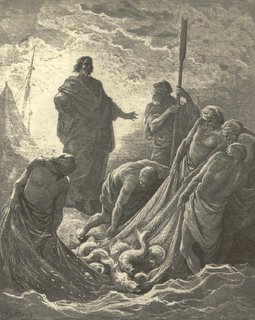 EASTER WEDNESDAY
EASTER WEDNESDAYThe second miraculous draught of fishes (St. Matth., xxviii, 16; St. John, xxi, 1-14)
After this the eleven disciples went into Galilee; [and] Jesus shewed Himself again to [them] at the sea of Tiberias. And He shewed Himself after this manner: there were together Simon Peter, and Thomas who is called Didymus, and Nathaniel who was of Cana in Galilee, and the sons of Zebedee, and two others of His disciples.
Simon Peter saith to them:
"-I go a fishing."
They say to him:
"-We also come with thee."
And they went forth and entered into the ship: and that night they caught nothing.
But when the morning was come, Jesus stood on the shore: yet the disciples knew not that it was Jesus.
Jesus therefore said to them:
"-Children, have you any meat?"
They answered:
"-No."
He saith to them:
"-Cast the net on the right side of the ship; and you shall find."
They cast therefore: and now they were not able to draw it for the multitude of fishes. That disciples therefore whom Jesus loved said to Peter:
"-It is the Lord."
Simon Peter, when he had heard that it was the Lord, girt his coat about him (for he was naked) and cast himself into the sea. But the other disciples came in the ship (for they were not far from the land, but as it were two hundred cubits) dragging the net with fishes. As soon as they came to land, they saw hot coals lying, and a fish laid thereon and bread. Jesus saith to them:
"-Bring hither of the fishes which you have caught."
Simon Peter went up and drew the net to land, full of great fishes, one hundred fifty three. And although there were so many, the net was not broken.
Jesus saith to them:
"-Come and dine."
And none of them who were at meat, durst ask Him: Who art thou? Knowing that it was the Lord. And Jesus cometh and taketh bread, and giveth them, and fish in like manner. This is now the third time that Jesus was manifested to His disciples, after he was risen from the dead.
At Matins from the Roman Breviary
Lesson iii
Homily of St. Gregory, Pope
Again, it may be asked why, when the disciples were labouring on the sea, the Lord appeared, after his resurrection, standing upon the shore, while before his resurrection he had walked upon the waves of the sea in the sight of the disciples. We shall soon see the reason of this, if we consider the inner nature of the case. For what does the sea represent, if not this present world, surging with the tumult of its ever-shifting fortunes, and with the billows of this corruptible life? What is signified by the solidity of the shore, if not the everlasting peace of eternity? Since therefore the disciples were as yet surrounded by the bellows of this mortal life, they were struggling on the sea: but since our Redeemer had now passed beyond the corruption of the flesh after his resurrection he was standing on the shore.





























